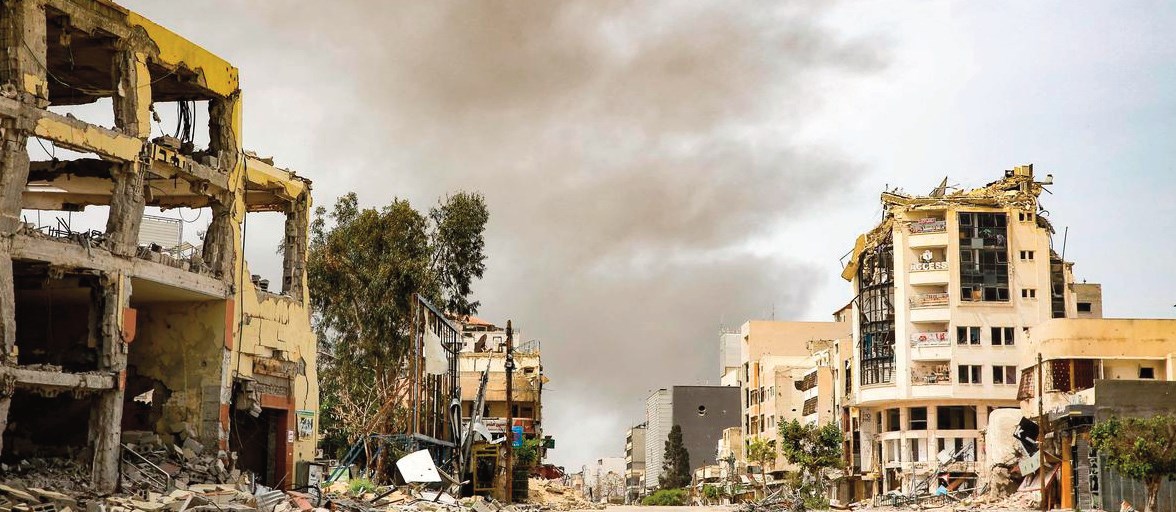The top United Nations court ordered Israel to take measures including opening more land crossings to allow food, water, fuel and other supplies into Gaza to tackle shortages. PHOTO COURTESY OF X.COM
The Hague, Netherlands (AP) — The top United Nations court on Thursday ordered Israel to take measures to improve the humanitarian situation in Gaza, including opening more land crossings to allow food, water, fuel and other supplies into the war-ravaged enclave.
The International Court of Justice issued two new so-called provisional measures in a case brought by South Africa accusing Israel of acts of genocide in its military campaign launched after the Oct. 7 attacks by Hamas. Israel denies it is committing genocide and accused South Africa of trying to “undermine Israel’s inherent right and obligation to defend its citizens.”
Thursday’s order came after South Africa sought more provisional measures, including a cease-fire, citing starvation in Gaza. Israel, which had urged the court not to issue new orders, said it places no limits on aid entering Gaza and vowed to “promote new initiatives” to bring in even more assistance.
In its legally binding order, the court told Israel to take measures “without delay” to ensure “the unhindered provision” of basic services and humanitarian assistance, including food, water, fuel and medical supplies.
It also ordered Israel to immediately ensure that its military does not take action that could that could harm Palestinians’ rights under the Genocide Convention, including by preventing the delivery of humanitarian assistance.
The court told Israel to report back in a month on its implementation of the orders.
Israel declared war in response to a bloody cross-border attack by Hamas on Oct. 7 in which 1,200 people were killed and 250 others were taken hostage. Israel responded with a campaign of airstrikes and a ground offensive that have left over 32,000 Palestinians dead, according to local health authorities.
The Health Ministry in Hamas-run Gaza does not differentiate between civilians and combatants, but say roughly two-thirds of the dead are women, children and teens. Israel says over one-third of the dead are militants, though it has not provided evidence to support the claim, and it blames Hamas for civilian casualties because the group operates in residential areas.
The fighting has displaced over 80% of Gaza’s population, caused widespread damage and has sparked a humanitarian crisis. The U.N. and international aid agencies say virtually the entire Gaza population is struggling to get enough food, with hundreds of thousands of people on the brink of famine, especially in hard-hit northern Gaza.
South Africa welcomed Thursday’s decision, calling it “significant.”
“The fact that Palestinian deaths are not solely caused by bombardment and ground attacks, but also by disease and starvation, indicates a need to protect the group’s right to exist,” the South African president said in a statement.
Hamas, an Islamic militant group sworn to Israel’s destruction, said the ruling must be enforced by the international community.
“It must be implemented immediately, so that this decision does not remain a dead letter,” it said.
The Palestinian Foreign Ministry thanked South Africa, calling the case “a vital step in the global effort to hold Israel accountable for perpetrating genocide.”
After initially sealing Gaza’s borders in the early days of the war, Israel began to permit entry of humanitarian supplies. It says it places no restrictions on the amount of humanitarian aid allowed into Gaza and accuses the United Nations of failing to properly organize the deliveries. On Tuesday, the army said it inspected 258 aid trucks, but only 116 were distributed within Gaza by the U.N.
The U.N. and international aid groups say deliveries have been impeded by Israeli military restrictions, ongoing hostilities and the breakdown of public order.
The Israeli Foreign Ministry accused South Africa of making “cynical attempts” to exploit the world court to undermine Israel’s right to self-defense and to win the release of remaining hostages. Israel says Hamas continues to hold some 100 hostages and the remains of 30 others either killed on Oct. 7 or who died in captivity.
“Israel will continue to promote new initiatives, and to expand existing ones, in order to enable and facilitate the flow of aid to the Gaza Strip … despite the operational challenges on the ground and Hamas’ active and abhorrent efforts to commandeer, hoard and steal aid,” it added.
Israel has been working with international partners on a plan to soon begin deliveries of aid by sea.
Israel has repeatedly feuded with the United Nations, particularly UNRWA, the U.N. agency for Palestinian refugees and main provider of aid in Gaza. Israel accuses the agency of tolerating and even cooperating with Hamas — a charge UNRWA denies.
The court said in its order that “Palestinians in Gaza are no longer facing only a risk of famine … but that famine is setting in." It cited a report from the United Nations Office for the Coordination of Humanitarian Affairs that said at least 31 people, including 27 children, have already died of malnutrition and dehydration.
The world court said earlier orders imposed on Israel after landmark hearings in South Africa’s case “do not fully address the consequences arising from the changes in the situation” in Gaza.
COGAT, the Israeli military body in charge of Palestinian civilian affairs, has also run pilot programs to inspect the humanitarian aid at Israel’s main checkpoints in the south and then use land crossings in central Gaza to try to bring aid to the devastated northern part of the Strip. The agency had no immediate comment on the ICJ ruling.













No Comment